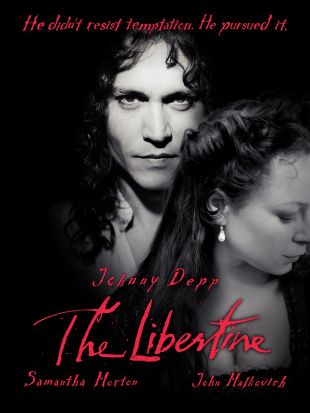
The problem with The Libertine is not that we don't like Johnny Depp's debaucherous and self-destructive Second Earl of Rochester -- as he anticipates in a prologue at the film's outset. The problem is that we never get to know him well enough to have much opinion about him at all. This is not for a lack of hardcore acting, as Depp delivers a fantastic performance in a role for which he could have easily phoned in an R-rated variation on Jack Sparrow, and supporting cast members like the tightly controlled John Malkovich and nakedly unaffected Samantha Morton also rise to the occasion. What The Libertine suffers from is a muddled script; while some scenes illuminate the characters and their relationships very well, the compilation of these scenes adds up to less than the sum of their parts. While the film depicts a sordid antihero whose refusal to utilize his intellectual gifts for more than hedonistic partying and oversexed adolescent rebellion is his downfall, it chokes on its explanation for why the earl is like this, even if the intention was to point out that there's no reason behind his self-sabotaging lifestyle at all. Even the depiction of said lifestyle isn't very clear, as the earl celebrates his reputation as a man-slut and eventually succumbs to the infamous VD consequences, and yet he's never seen in the arms of a woman other than the few he has a history with and commitment to. In this same way, the scenes where Depp coaches Morton in her stage acting never really create a mutually cognitional relationship, and his scenes with Malkovich's King Charles II never really establish the earl's personal paradigms about obligation or authority. It all ends up leaving you too much on the outside to sympathize even with the earl's own bewildered loved ones. Half the time the dialogue is distractingly modern, the other half it's so overstuffed with rapid-fire period speak that by the time you've sorted out all the allusions, puns, and double-negatives, you've missed the next three lines in the script. It doesn't help that on top of a pull-no-punches production of less-than-sanitary 17th century England, the cinematography uses such over-the-top soft focus that the movie looks like it was shot through a glass of piss. First-time director Laurence Dunmore can't be blamed for trying: a story with such personal, political, historical, and psychological ground to cover sounds like any filmmaker's dream. The Libertine shows enough promise that even though he didn't achieve it here, we can probably assume that Dunmore is capable of creating a film in which we may not like the protagonist, but we at least care about what happens to him.
